REDDAM EARLY LEARNING SCHOOL ST LEONARDS NEWSLETTER

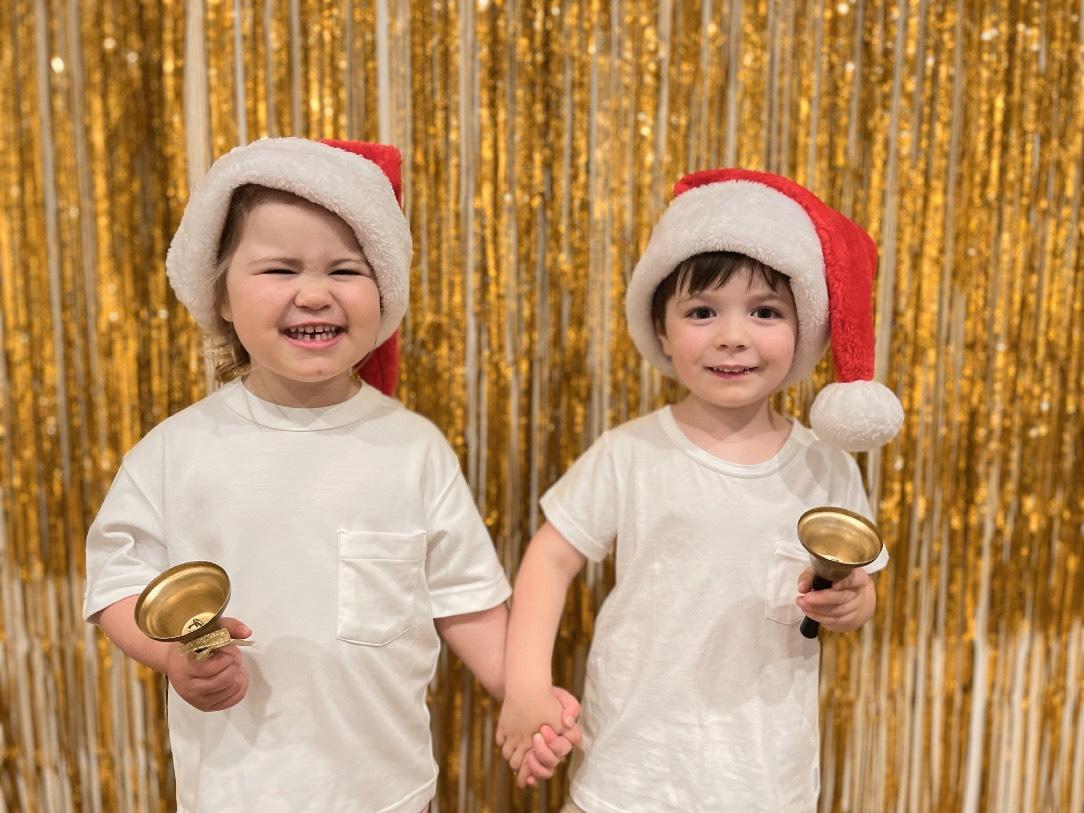
Principal’s Message

Dear Parents,
By Mrs Simone Cooke
Setting up interesting and engaging activities that offer invitations to play is central to our Reggio Emilia belief that there are “ three teachers of children: adults, other children and their physical environment” ( Loris Malaguzzi). One element which our teacher’s use in setting up an environment with purpose and intent, to promote engagement and curiosity is the use of is use of “Small World Play”. This consists of providing the children with miniature environments which they can use to extend their imagination, re-enact stories and act out scenarios that allow them to make sense of the real world.
Small World play is particularly beneficial for building children’s language skills as the children build their expressive skills and narrate what they are creating during their play. This often involves explaining the choices that they are making, re telling well known stories and inventing new ones. This builds their vocabulary and allows them to practise using new words in context. This enables them to start rich conversations with peers, as they compare the scenes and stories which they are creating and will often recite phrases from stories as they relay dialogue between animals and characters and draw upon past stories they have heard.
Offering the children small world environments allows them to process and act out daily events and recall past experiences such as feeding an animal, driving a car or putting a baby to sleep, it also encourages them to be creative and experiment with different roles. We often hear the children incorporate their own experiences into these play scenarios such as “ I’m the mother and I’m patting the baby to sleep because she had a bad dream” or “ My dog has been naughty so he has to stay on his dog bed” . This type of role play allows children to take control over their play and allows them to experiment with different outcomes and practice cause and effect in a safe way.
REDDAM EARLY LEARNING SCHOOL | ST LEONARDS NEWSLETTER
March 2023
3rd
1
Principal’s Message Continued…
Engaging in Small World play with others also encourages children to share and imagine together, this is very important as it assists them in sharing knowledge and skills and is a wonderful opportunity for them to learn from one another. Socialising with others in this way boosts confidence and self-esteem and helps to build conflict resolution in even young toddlers who begin to learn the concept of sharing and turn taking as they rotate materials. It is also encourages children to use positional language such as under, over, next to, left, right, above, below , as they create their miniature world and describe the processes they are adopting.


In the process of creating small world environments the children are often learning many practical skills that prepare them for life such as “don’t leave the hot pot on the stove” or “you have to drive the car on the right side of the road or you will have an accident”. This helps children to practice rules and routines that occur in the real world and allow them to practice these skills before they will ever be required to do so in real life.
1st April 2022
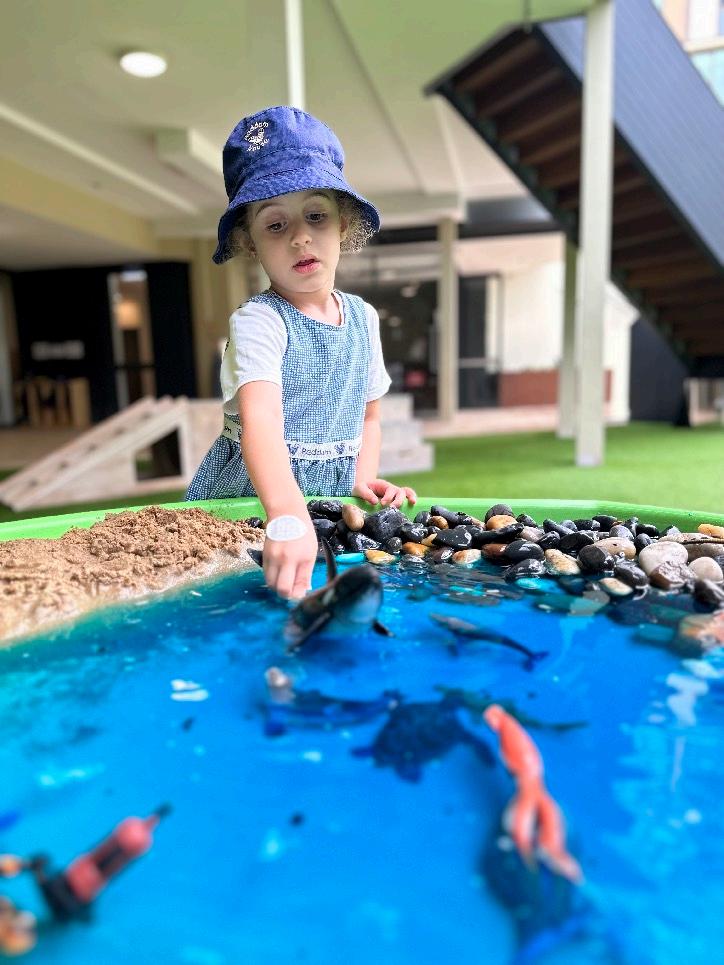
| ST LEONARDS NEWSLETTER
2

REDDAM EARLY LEARNING SCHOOL | ST LEONARDS NEWSLETTER 3
Stage 4R
Keeping Our Ocean Clean!
By Ms Riina Andrews
This week, we explored an environmental issue of ‘How to keep our ocean clean’. As we have been talking about ocean life and the eco-systems in the ocean, our curiosity took us to the topic of what is good for the ocean and what may be not so good!
Ella: “plastic is not good cause it will go on their heads”
Elizabeth: “toilet paper is good for the ocean”
Sophie: “rubbish plastic is not good for animals cause they might get sick”
Aneilia: “rubbish is bad’
Finn: “rubbish like paper is not good”
Joseph: “green rubbish is bad”
Kyson: “plankton is good not bad”
Ethan: “plastic is bad cause you cannot throw it in the water”
Summer: “don’t put in blue plastic”
Morgan: “don’t put blue rubbish in the ocean”
Hazel: “rocks are good in the ocean”
Franco: “we just swim and make sandcastles”
To foster this questioning, I decided to prepare an experiment of what happens if the ocean is filled with pollution. We then set up some trays with all the items that you may find in the ocean and added blue water. I then provided a variety of items that should not be found in the ocean and the children added these to the ocean trays. We then noticed that the plastic got caught on the sea creatures and decided that if this happened, the sea animals would not be able to swim! We then added an ‘oil spill’ to the water trays, mixed the pollution around and noticed again that the sea creatures were being harmed and their homes were being polluted. Using small brushes, we cleaned the sea animals in clean water, after first removing the plastic items and soaking up the ‘oil spill’ with cotton balls!
The letter of the week was B. We had some wonderful items, such as, balloons, brushes, babies, books, bread and even Bluey! The children have all really loved sharing their news items each week and are getting more confident when it is question time as they are thinking about meaningful questions to ask instead of making statements!
REDDAM EARLY LEARNING SCHOOL | ST LEONARDS NEWSLETTER 4

REDDAM EARLY LEARNING SCHOOL | ST LEONARDS NEWSLETTER 5
Stage 4R


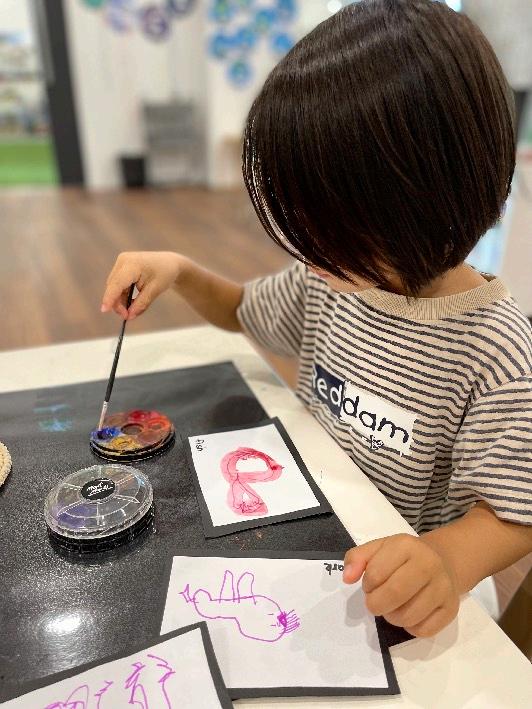


REDDAM EARLY LEARNING SCHOOL | ST LEONARDS NEWSLETTER 6
Stage 4R





REDDAM EARLY LEARNING SCHOOL | ST LEONARDS NEWSLETTER 7
Stage 4E
Healthy Eating and the Importance of Water
By Ms Emily Brazel
It's extremely important for children of this age to continue (or to start) to lead a healthy lifestyle, including eating nutritious meals, as well as getting plenty of exercise and adequate sleep every day. This week the children discussed what it means to be healthy and the importance of keeping their body healthy and active. Teaching children to habitually eat moderate portion sizes and to choose healthy foods in preference to junk foods becomes increasingly important as children begin to spend more time away from home and gain more independence over their food and activity choices.
This week the children learnt about the Food Pyramid. The Food Pyramid is a visual representation of how different foods and drinks contribute towards a healthy balanced diet. For young children, this is especially important, as the eating habits they adopt in early life can have lasting impacts on their approach to food later in life too. It is also vital that children receive all the nutrients and energy they need to aid their physical and mental development.
What food belongs in your stomach?
As an extension from last weeks provocation; bones, the children have been discussing ways in which they can keep their skeletal system strong and healthy. Stage 4E were invited to practise their cutting skills, hand-eye coordination and scissor grip. This whole group experience encouraged the children to use their thinking skills to decide what food is healthy and what food is for sometimes. We started off by having a group discussion around being healthy and what food should go into our bodies to give us energy and make us grow big and strong. Miss Emily then showed the children the correct scissor grip before letting them get to work. Each child was asked to cut out a few healthy foods and a few sometimes food. Once this was complete one by one the children used the glue stick to decided which side of the chart the food belongs. This activity encouraged fine-motor strength, finger and thumb position of the scissors, bilateral coordination and improve attention to tasks. The children then had the opportunity to do this individually afterwards.
Welcome to our classroom Dr Mike!
On Tuesday Stage 4E was fortunate enough to have a surgeon come into our classroom to talk about the skeletal system and the bones in our body. Dr Mike spoke to the children about the importance of keeping our bones healthy and strong and ways we can do so. He introduced them to a small skeleton and showed them a variety of bones. We finished with a song and a dance about the bones! This was a great way to promote healthy eating and healthy drinking and the importance of taking care of our bodies. It was really great to hear the children ask questions to seek answers, showing excitement as they listened and interacted with Dr Mike.
Thank you so much Dr Mike for coming into Stage 4E.
Following on from this the children were invited to a healthy feast with the food they had bought in from home. We also enjoyed our very own tomatoes in which we had grown in the garden ourselves! They were delicious!
REDDAM EARLY LEARNING SCHOOL | ST LEONARDS NEWSLETTER 8
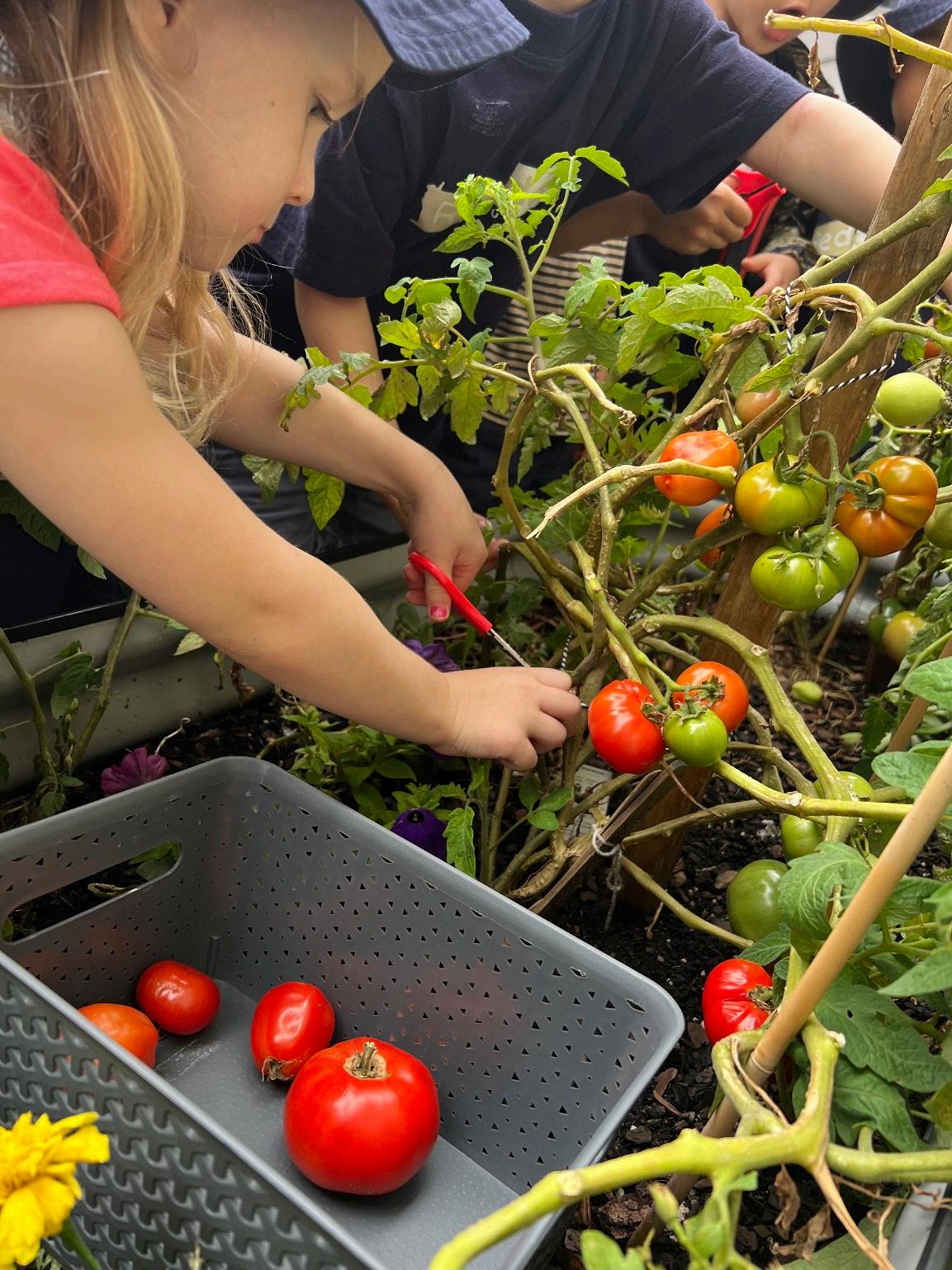
REDDAM EARLY LEARNING SCHOOL | ST LEONARDS NEWSLETTER 9
Stage 4E: Eating Tomatoes





REDDAM EARLY LEARNING SCHOOL | ST LEONARDS NEWSLETTER 10
Stage 4E: The Food Pyramid





REDDAM EARLY LEARNING SCHOOL 11
Stage 4D
Eggs To Your Plate
By Ms Sarah Ross
This week Stage Four continued their Paddock to Plate learning provocation with an investigation into where eggs come from and their journey from the chicken all the way to our plates.
Our learning journey began with exploring the life cycle of a chicken. The children discovered that after the eggs are laid the chick has all the food and nutrients it needs to grow inside the egg. After 21 days the chick hatches and appears small and fluffy. As the chicken grows its features will change with the feathers changing colour and will grow a ‘comb’ on the top of its head. Once the hen is fully grown it will start laying eggs of its own!
Following this investigation, the children consolidated their ideas and new knowledge through a drawing and event sequencing activity where each child drew the life cycle of a chicken beginning with the egg and ending with the mother hen. This was a lovely way for thea children to demonstrate their learning and comprehension from our reading and discussion groups.
As we furthered our investigation, we explored a text called ‘Eggs to your plate’ that followed the process that eggs go through before making their way home in our shopping bags. Beginning with laying and collection the children discussed the ethics involved with choosing eggs in the supermarket and agreed it is best to buy eggs that are free range as the chicken laying the eggs lives a happier life in the farmyard rather than in a cage.
Following this, the children discovered that eggs go through a lengthy process of being washed, tested, weighed, sorted and labelled before being packaged and loaded into trucks to be transported to our local supermarkets. The children were eager to share that they enjoy eating eggs at home and shared all the way they like their eggs cooked.
“I like my eggs sunny side up” – Matthias
“I like my eggs scrambled” – Sofia
“I like my eggs soft boiled” – Ayana
Farmyard Counting
“I like dippy egg” – Linda
“I like my eggs fried” – Claire
“I like my eggs soft poached” – Theo
As young children begin to develop their numeracy skills it is important that they master foundational skills such as one-to-one correspondence. One-to-one correspondence is the ability to pair each number counted with a number word. The Stage Four practiced this skill by reading numbers on barn houses and using farm animals as concrete materials to count out each number. As the children lined up the animals, they pointed to each one and assigned a number to each animal until they could match the number on the barn house image. The children demonstrated excellent focus during this activity and began to identify numbers they were unsure of with teacher and peer support.
REDDAM EARLY LEARNING SCHOOL | ST LEONARDS NEWSLETTER 12

REDDAM EARLY LEARNING SCHOOL | ST LEONARDS NEWSLETTER 13
Stage 4D: Life Cycle of Chickens


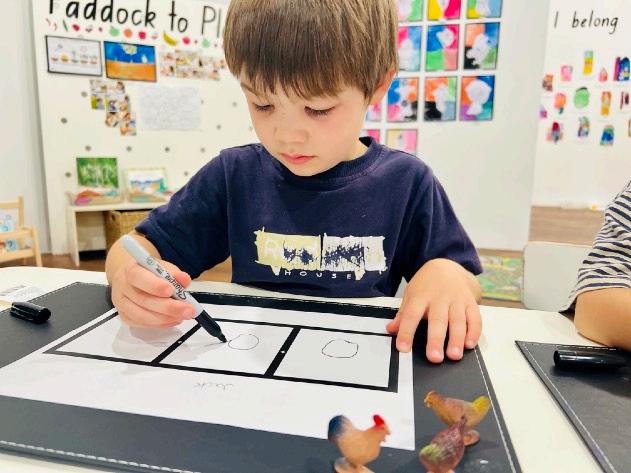


REDDAM EARLY LEARNING SCHOOL | ST LEONARDS NEWSLETTER 14
Stage 4D: Farm Animal Counting





REDDAM EARLY LEARNING SCHOOL | ST LEONARDS NEWSLETTER 15
By Ms Emily Chacon
Marvellous Me
This week has been very busy for the children! We concluded our unit of Healthy Bodies and we ended with a delicious bang. Chef Caleb came to the classroom to show the children how he prepares their afternoon tea. The children all washed their hands and excitedly sat down at the tables.
Firstly, he went through the importance of kitchen safety, which the children were eager to be involved in as this will be our next unit, ‘I am safe’.
Next Caleb engaged the children in a class discussion on healthy eating and the importance of a balanced diet. The children continued watching as Caleb cut up all their fruits and place them into a bowl.
Once everything was ready, bowls with every fruit were passed around with a skewer and tongs. The children were guided to carefully begin placing their fruits on. Then it was time to EAT THEM!
Following our healthy eating unit we researched how vegetables grow, some on bushes and others in the ground. The children then engaged in an art project. We firstly watched a time lapse clip of a carrot growing. The children loved this, as they could see the carrot forming under the soil.
Once the clip was finished the children then were guided through to draw, Miss Emily went step by step on the board while the children followed.
Following instructions is important in helping children learn new skills and function well in different environments. It also builds on a child’s ability to complete tasks and further develop self-confidence.
We further explored ways to keep our bodies healthy by looking for things we can do on the daily, like brushing teeth and washing hands. On our table, the children were provided an image of a tooth. With a whiteboard marker, the teacher had created holes and marks on them to represent cavities. With a toothbrush and shaving foam, the children needed to brush out the marks. This experience symbolises the importance of brushing our teeth daily.
As our other table activity, the children were given a catalogue to look through. Their task was to search for healthy foods, once found, the children then were given scissors to cut them out and glue to stick them into their trolleys. Cutting engages the children in further developing fine motor and hand-eye coordination skills. Learning to use glue develops hand-eye coordination and fine motor planning skills. It also helps your child understand the sensory concept of stickiness.
Stage 3/4
REDDAM EARLY LEARNING SCHOOL | ST LEONARDS NEWSLETTER 16

REDDAM EARLY LEARNING SCHOOL | ST LEONARDS NEWSLETTER 17
Stage 3/4: Fruit Kebabs

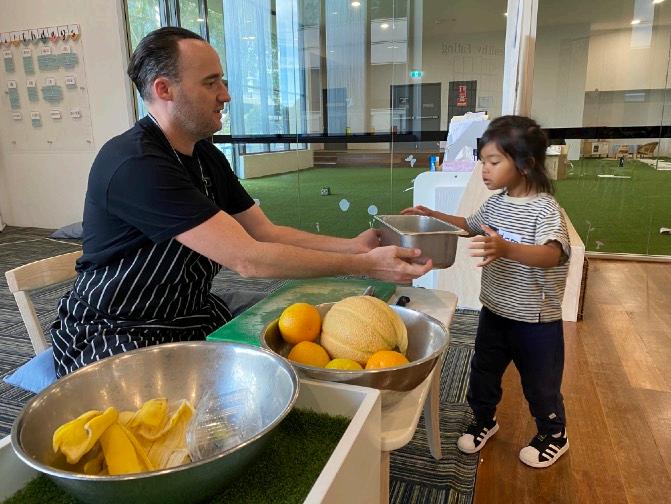



REDDAM EARLY LEARNING SCHOOL | ST LEONARDS NEWSLETTER 18
Stage 3/4: Carrot Time Lapse Art


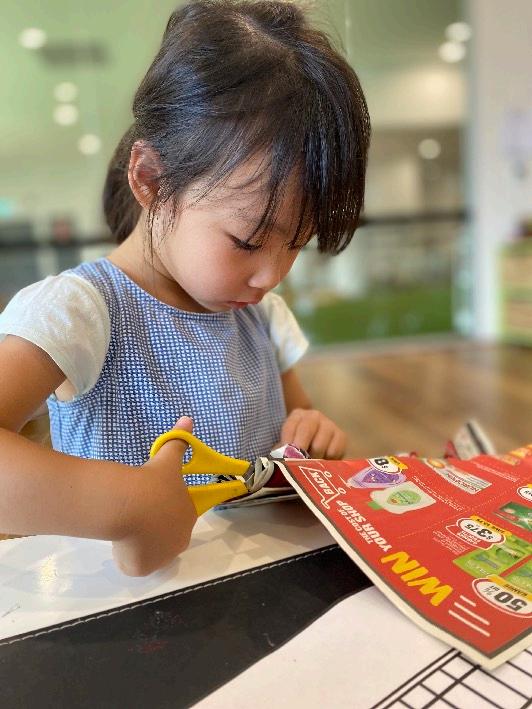


REDDAM EARLY LEARNING SCHOOL 19
Stage 3E
I Am... Creative
By Ms Carolina Machado
Exploring our sense of creativity, our engaged learners worked on different activities this week. Starting from a collective mind map, the children were asked what they would like to create. Here we have a few answers:
“I will make my family!" - Liam
“I want to build Race cars" - Reyansh
“Let’s make some Coloured sand" - Aydin
“I can create a birthday cake!" - Caroline
“Let’s make some Houses" - Sienna, Isabella & Harry
Throughout the week, a class collage was made using different material each daycrayons, textas, pencils, painting to add it to our collaborative activity to our blowing painting where the students chose from blowing the painting with straws and texturizing it with aluminum foil and cotton balls.
The "Explore through coloured windows?" activity was responsible for stimulating our students' curiosity throughout the week. They quickly found out what colours they could make when mixing up the small windows, and they had so much fun!
The children have been focusing on collaboration and working with others for a common goal. This provides children with the opportunity to take on a variety of different roles with children being researchers, leaders and providing resources and rotating these.
Building fine motor skills is also important in the Preschool years as we prepare children for the writing process. Pencil and scissor grip is explored in our group activities which builds the children’s confidence and self-esteem.
We have also been looking this week at building the children’s concept of time by looking at days, weeks and seasons and changes that take place in the world around us.
It was a great week to highlight how curious our little ones can be and the amazing things they can create! Have a wonderful weekend!
REDDAM EARLY LEARNING SCHOOL | ST LEONARDS NEWSLETTER 20

REDDAM EARLY LEARNING SCHOOL | ST LEONARDS NEWSLETTER 21
Stage 3E: Exploring Coloured Blocks


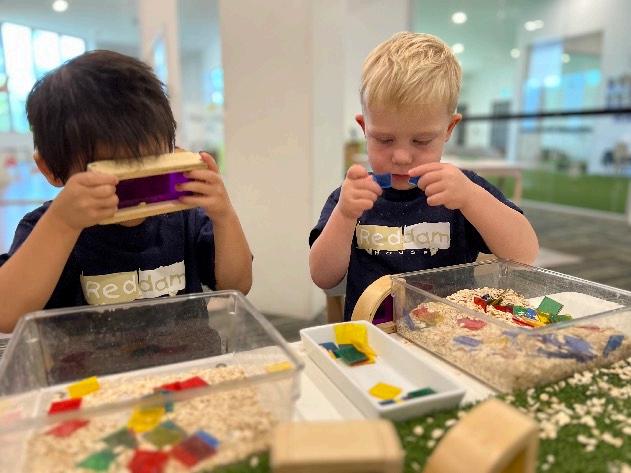


REDDAM EARLY LEARNING SCHOOL | ST LEONARDS NEWSLETTER 22
Stage 3E: Straw Art





REDDAM EARLY LEARNING SCHOOL | ST LEONARDS NEWSLETTER 23
Stage 2/3 and 3R
All About Faces
By Ms Gabriela Guimarães
This week we explored the wonderful world of faces. Children are fascinated by facesfrom recognising familiar faces to making funny faces, their expressions and emotions are a never-ending source of interest and learning.
Exploring Emotions
One of the key aspects of faces is their ability to convey emotions. We've been exploring different emotions through our faces and discussing how our expressions can help others understand how we're feeling. We've played games like "Guess the Emotion", where children take turns making a face to represent a particular feeling, and their classmates must guess what it is. This activity has helped to build emotional intelligence and empathy, as children learn to recognise and understand different emotions in themselves and others.
Creating Funny Self-Portraits
Another fun activity we've been doing is creating self-portraits. Each child has been given a mirror and a piece of paper, and encouraged to study their own faces. They've then used pencils, crayons, and other art supplies to create a picture of themselves, paying close attention to the shapes, colors, and features of their faces. This activity has helped to develop fine motor skills, spatial awareness, and self-awareness, as children learn to recognize and appreciate their own unique qualities.
Eyes Investigation
We set up an invitation for the children to explore the different size, shapes and eye colours. We played the who am eye game and the children shown great ability in finding their own eyes and their peers ‘eyes.
Brushing Teeth
When exploring face features, we talked about our mouth and what we use it for. A lot of the children talked about for brushing teeth and based on this interest we set up a provocation to brush germs of some dirty teeth which gave us the opportunity to talk about healthy and unhealthy foods.
Our exploration of faces has been a fun and fascinating journey for us all. We hope that these activities have sparked some interesting conversations and learning opportunities at home, and we look forward to continuing our exploration of the world around us in the weeks to come.
REDDAM EARLY LEARNING SCHOOL | ST LEONARDS NEWSLETTER 24

REDDAM EARLY LEARNING SCHOOL | ST LEONARDS NEWSLETTER 25
Stage 3R: Can You Brush Your Teeth?





| ST LEONARDS NEWSLETTER 26
Stage 3R: Eyeball Investigation





REDDAM
EARLY LEARNING SCHOOL
Stage 2/3: Eyeball Investigation





REDDAM EARLY LEARNING SCHOOL | ST LEONARDS NEWSLETTER 28
Stage 2/3: Making Funny Faces





REDDAM EARLY LEARNING SCHOOL 29
By Ms Madeleine Grant
Zoom, Zoom, Zoom, We’re Going to the Moon!
The children loving singing the rocket ship song during group times, calling out the countdown and acting out blasting off into space! This week as we explored the letters M, N and O we decided to connect all three to the song, incorporating STEM as we explored the Moon, Numeracy, and Outer Space.
M is for Moon
The children loved the activity that blended art and science and saw them creating beautiful moon art. In a round tin we placed some paper, and covered some marbles in paint to track the paths they took as they rolled around the tray. We talked with them about how the marbles rolling around the edge of the tray was like how the moon orbits the Earth. While this is a concept that may be beyond their understanding at this age, it is never too early to expose them to the wonders of the world (and beyond) that surrounds them. Some took a different approach to the task, shaking the tray or tilting it back and forth, to create squiggly patterns or sharp, zig zagging lines. The result was a range of beautiful, colourful moons that were each as different and unique as their creators!
N is for Numeracy
The early years are full of opportunities for children to engage in numeracy, often in ways that are so fun they don’t realise they are learning! Many of the songs we sing in our group times incorporate numbers, such as counting down from 10 in the rocket ship song, counting down from five in ‘Five Little Ducks’, and up to three in ‘Baa Baa Black Sheep’. Incidental numeracy is also a regular part of our day; we count around when we do headcounts and the children count along with us, and when they play we encourage them to refine their numeracy skills by counting, sorting, and sequencing the toys they play with.
O is for Outer Space
We extended the other activities through creating sensory trays to represent the moon, stars and planets. In tubs of rice dyed with galaxy-inspired colours they found pom poms, glitter, foil balls and pipe cleaners. They also were given wooden boards with numbers carved in, and asked if they could identify the number they had been given. Once the had we encouraged them to dig around in the tray and try to find that number of objects., and count it out for us as they placed them on their board.
2E
Stage
REDDAM EARLY LEARNING SCHOOL | ST LEONARDS NEWSLETTER 30

Stage 2E: Moon Art





| ST LEONARDS NEWSLETTER 32
Stage 2E: Outer Space Numeracy




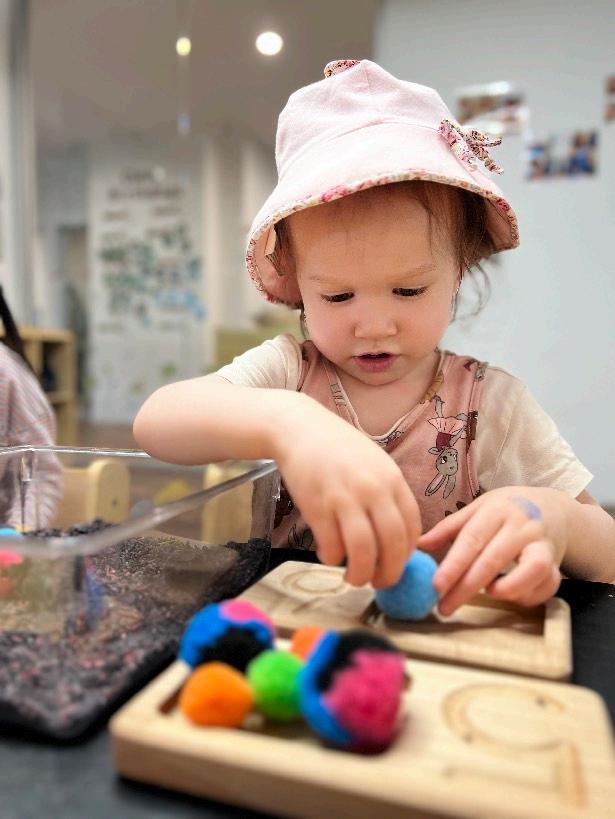
REDDAM EARLY LEARNING SCHOOL | ST LEONARDS NEWSLETTER 33
Stage 2R
Investigating the Letters I and J
By Ms Ailene Caballes
“A child’s play is not simply a reproduction of what they have experienced, but a creative reworking of the learning experiences they have acquired.”
- Lev Vygotsky
I is for Ice-cream
Sensory experiences help children to make sense of the world around them because it provides them the learning opportunity to explore/investigate using their senses. Our “I is for Ice-cream” provocation came about when we observed the children enjoying playing with our little cafe shop in our dramatic play area found in our outdoor playground these past few weeks. We decided to incorporate the children’s current interest in ice-cream in our Alphabet exploration provocation.
The children happily engaged in our provocation and enjoyed using the ice cream scoops to make our ice-cream out of our play dough. The children strengthen their fine motor skills as they use our ice-cream scoops and manipulate the shape and texture of the play dough. The provocation also builds on the children’s creative and imaginative skills as they come up with different ideas to construct the play-dough mixture to create their ice-cream.
J is for Juice
The Australian Early Years Learning Framework promotes children’s ability to exercise their sense of agency over their individual learning and development, therefore as educators we take upon the role to scaffold their learning through the planning and implementation of engaging provocations. Our Stage 2R team of educators have observed that during morning and afternoon tea the children enjoy creating a sensory experience of their fruits as they explore what happens when they squish their watermelon and oranges. To extend on their curiosity, Ms Ailene implemented the “J is for Juice” provocation which provides children the opportunity to explore how juice can be extracted from certain kinds of fruit.
During our group time circle, Ms Chisa demonstrated to the children how to use the squeezer to extract juice from our fresh oranges. The children were amazed at how much juice can be extracted from oranges and lemons. They were very happy and excited to taste the juices they worked so very hard to squeeze from their oranges!
Next week, the Stage 2R children will be exploring the letters K, L and M in our fun-filled provocations!
REDDAM EARLY LEARNING SCHOOL | ST LEONARDS NEWSLETTER 34

REDDAM EARLY LEARNING SCHOOL | ST LEONARDS NEWSLETTER 35
Stage 2R: I is for Ice Cream





REDDAM EARLY LEARNING SCHOOL | ST LEONARDS NEWSLETTER 36
Stage 2R: J is for Juice



Stage 1E
By Ms Alessia Angilletta
“Every child is a different kind of flower, and altogether make this world a beautiful garden”
This week the children enjoyed a new topic for the provocations, after observing how interested the children were in looking at all the bugs, butterflies and bees that we found in our beautiful garden, we decided to focus on mini-beasts.
As I’m sure you have noticed our classroom has been decorated and has a garden, with beehive and some other features that allow the children to explore and to learn more about bugs.
During group time the children sang the song “Fly like a butterfly” and following that they had a turn at observing our toy butterfly and point out the different colours that were on the wings great way to practice colour recognition and taking turns as they were passing the toy around.
The provocation for this week included play-dough spider print, it was a great activity to hence the children fine motor skills as they were pressing and moving the spider around on the play dough, the other benefits of using play dough are developing eye-hand coordination, the ability to match hand movement with eye movement.
The other activity was “insect rescue” we placed some tape on the containers and the children had “rescue” all the different bugs, they had so much fun doing it, this activity was great to support the children focus and fine motor skills as promote mindfulness as well.
Art was also related to the bug world, after noticing how captivated the children were by the butterfly group time observation we decided to engage in “butterfly art”, the educator used the primary colour such as red blue yellow and placed it onto the paper on different spots guided by the children, then folded the paper and squished the paper, then open the paper and observed the design that came out.
The children were so proud off it so we decided to expose it on the class wall, feel free to come and have a look at it.
REDDAM EARLY LEARNING SCHOOL | ST LEONARDS NEWSLETTER 38

Stage 1E

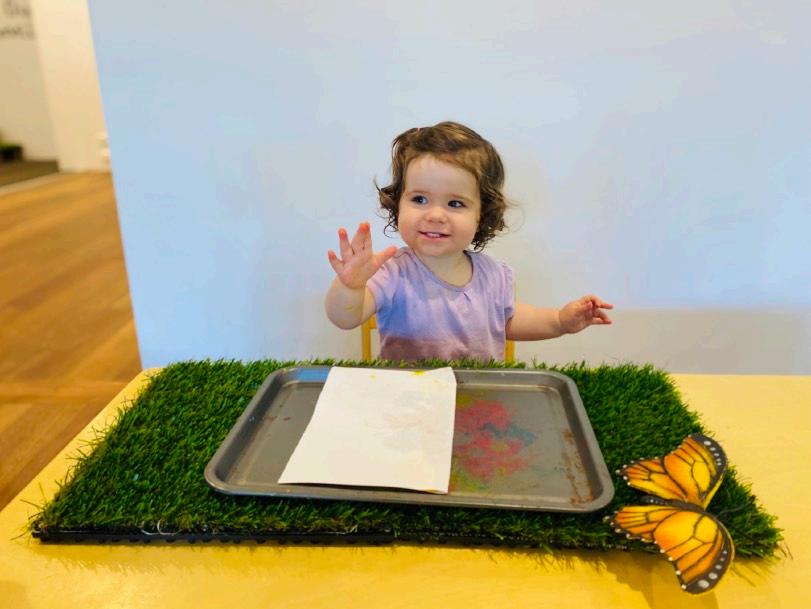



REDDAM EARLY LEARNING SCHOOL





| ST LEONARDS NEWSLETTER 41
Stage 1E
Stage 1R
Hey Diddle Diddle
By Ms Amanda Felton
Nothing like sunshine and playing in the garden that support building our social skills as a class. All the Babies are doing so well in this area of development by playing with each other and learning to get along and every showing a very caring side when someone is upset. It is really lovely to see how far our Babies have come in such a short time here at Reddam.
Hey Diddle Diddle! The cat and the fiddle…the cows jumps over the moon…
Our intentional learning experience is based upon coordination, dexterity skills and collaboration with others in a group. We all sat in a circle and took turns to mix move the spoon and the dish by mixing and tapping. All the Babies did very well and we also had some very keen Babies to help others. Well done everyone on the waiting turn and sharing with others.
We also extended our experience by drawing the dish and the spoon. All the Babies had fun using their dexterity skills with the colourful tester pens by doing a drawing of the dish and the spoon. Well done Babies great effort all round!

REDDAM EARLY LEARNING SCHOOL | ST LEONARDS NEWSLETTER 42
Stage 1R





REDDAM EARLY LEARNING SCHOOL 43
Drama
By Ms Laura Hudson
This week in drama the children realised that theatre involves teamwork, and everyone has a role with something important to contribute.
To begin the lesson, we started with a warmup game called Huggie Bear: Everyone walked slowly around the room when I called out a number everyone had to group together into “hugging clumps” of that number. They repeated this several times with different numbers and I even added in some shapes for Stage 4 to create. They created the Opera House, knives and forks and a working elevator!
Next, we discussed being an ensemble. I asked the children if they had ever watched or been part of a sports team. Discussing how all the players must work together to play a game. This then led into talking about how we also must work as a team in theatre. This is called a cast or an ensemble. All the parts are important, and everyone has a job to do.
In Stage 3 and 4 we played a focus exercise - ABC Shapes. Capital letters were written on a sheet of paper. I quietly showed a group of three students a letter they should form using their bodies. Telling them to work together to make the letter. The rest of the group then tried to guess what letter they had formed. Well, done Stage 3 and 4 on working together.
Everyone loved the final 2 parts of the lesson. We created a machine! We began with one student making a continuous noise and a simple repeatable gesture. One by one, each child joined in with their own noise and movement, until everyone was working together to create a continuous machine. In Stage 2 we did this in groups. After a few minutes, I stopped them and asked what kind of machine they had created and what they imagined their part to be. They repeated this with a different leader and were reminded to use a different noise and movement than last time. Well, done to Zac for getting up and giving it a try and Valentina and Madeline participated in the activity really well.
The final part of the lesson was all about Imagination: Wax Museum. Here everyone spread out around the room and froze like statues in a museum. The children were encouraged to creatively come up with different animals or characters. For the first round, I was the security guard. Walking around the room, inspecting all the statues. The goal of the game is for a child to tap me on the back without me seeing them move. If I catch a child moving, they must sit down until the next round. If a child succeeds in tagging me or if there is only one child left standing, they switch out and that child became the next security guard.
In the younger years the children started with a mirroring exercise whereby they copied the actions I did. We started slowly with some very basic copying and moved into waving and standing on one leg in Stage 2/3. Well, done to Isabella and Austin they did some wonderful copying and even told me that we were miming as we were using no words. Next, I asked the children to use the pom poms to create a campfire, we sung ‘Kookaburra Sits on the Old Gum Tree’ and of course toasted marshmallows, using the mime technique. Josh and Isaac were very good listeners and used a quiet inside voice.
Well, done everyone excellent drama this week!!
REDDAM EARLY LEARNING SCHOOL | ST LEONARDS NEWSLETTER 44





| ST LEONARDS NEWSLETTER 45
Drama
Yoga By Ms Carol Vasconcelos
This week we had the illustrious presence of our friend Lion. We did a very funny job of breathing with your roar.
In Stages 1 and 2, we worked more breathing and contact with the lion, represented by a toy, he received many hugs and everyone shared this experience. In this first contact, we also made some similar postures to this animal and talked about how strong it is and full of friends.
In Stages 3 and 4 we approach the same force that the Lion has, in a more practical and fun way. Everyone made many breaths (Pranayamas) and many “roars"!
The set of postures, breaths and relaxation are powerful sources to calm the mind and relax the body. In addition, they are effective tools for controlling emotions. The moments of stillness that children experience help them overcome moodiness and uncontrolled emotions, beginning to face their challenges and moments of stress in a more balanced and harmonious way.
Namaste.

REDDAM EARLY LEARNING SCHOOL | ST LEONARDS NEWSLETTER 46
Yoga




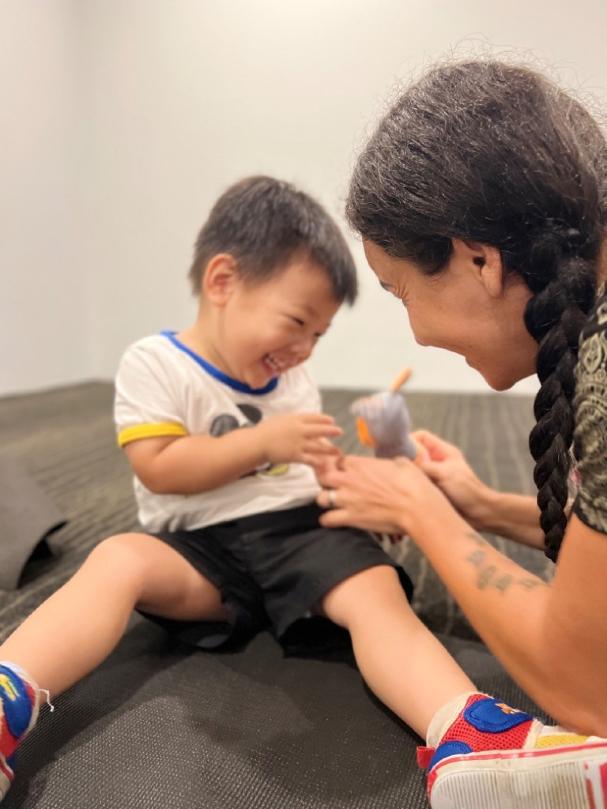
REDDAM EARLY LEARNING SCHOOL
Piano
By Mr Alan Tang
This week is week 3 of piano lessons. Across Stage 3, 3/4 and 4, we are learning how to read Middle C along with Treble Clef and Bass Clef. The children are reminded to use their thumb when playing the Middle C to build the correct hand posture for the piano playing.
Stage 2 and below are taught how to identify the pattern of the keys again with games. Major and Minor tonality are revised to build up their musicality. Also there are some exciting dances and singing which helps build positive feelings toward music for these






REDDAM EARLY LEARNING SCHOOL
Piano
My Gym




REDDAM EARLY LEARNING SCHOOL | ST LEONARDS NEWSLETTER 50

REDDAM EARLY LEARNING SCHOOL | ST LEONARDS NEWSLETTER 51




REDDAM EARLY LEARNING SCHOOL | ST LEONARDS NEWSLETTER 52 Mandarin


















































































































































